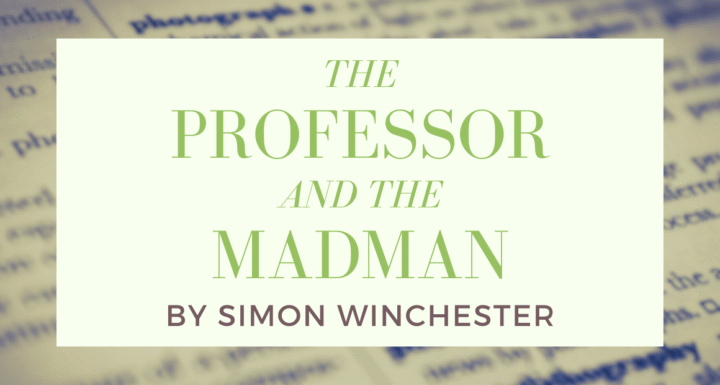Title: The Professor and the Madman -A Tale of Murder, Insanity and the Making of the Oxford English Dictionary
Author: Simon Winchester
Publisher: Harper Perennial
Genre: Biography, History
First Publication: 1998
Language: English
Book Summary: The Professor and the Madman by Simon Winchester
The Professor and the Madman, masterfully researched and eloquently written, is an extraordinary tale of madness, genius, and the incredible obsessions of two remarkable men that led to the making of the Oxford English Dictionary — and literary history.
The compilation of the OED, begun in 1857, was one of the most ambitious projects ever undertaken. As definitions were collected, the overseeing committee, led by Professor James Murray, discovered that one man, Dr. W. C. Minor, had submitted more than ten thousand.
When the committee insisted on honoring him, a shocking truth came to light: Dr. Minor, an American Civil War veteran, was also an inmate at an asylum for the criminally insane.

Book Review: The Professor and the Madman by Simon Winchester
The fascinating, appalling, sad tale of the lunatic American, John Minor, who became one of the most prolific contributors to the Oxford English Dictionary as it was being created by its learned Scottish editor, James Murray – while Minor dwelt in an asylum for murder. The Professor and the Madman is an amazing tale, well worth telling, even if Winchester pads it with purple prose and much tangential material.
In The Professor and the Madman, the author Simon Winchester introduces us to two very different men whose lives converge in an unlikely way, which involved the monumental task of creating The Oxford English Dictionary, The history of the work that came before the OED was very interesting, and may have been my favorite part of the book. I still can’t imagine how the OED was accomplished before word processors. Actually, the project started before typewriters.
“His life was merely a slow-moving tragedy, an act of steady dying conducted before everyone’s eyes.”
The man that lead this operation was lexicographer and philologist James Murray, and work started in 1857. From 1884-1928, the dictionary was published in instalments, or fascicles, which is the more technical term. (A new word for me). Seventy years of work! Murray died before it was completed, something he had not foreseen.
Before the reader gets to the part about the making of this amazing dictionary, however, they are presented with mystery and murder. It’s not mysterious at all; a delusional American guns down an innocent man as he makes his way to his menial, graveyard-shift job. The murder is committed by William Minor because of a paranoid fantasy about the other man trying to break and enter into his room. The murdered man was George Merrett, a man with a wife and several children. (I did admire the way the author paid respect to the victim.)
The Professor and the Madman by Simon Winchester is part biography of W.C. Minor, part history of how the Oxford English Dictionary came to be.
“The language should be accorded just the same dignity and respect as those other standards that science was then also defining.”
Personally, I found the OED stuff the far more interesting of the two. James Murray came up with an incredibly unique approach to creating the dictionary, and it’s astonishing that he had volunteers all over the world reading any number of books and sending in quotations to represent each word in the English language. It’s oddly hilarious now to see how quickly they thought the project would be finished, as if defining the entirety of the English language was a walk in the park.
Minor’s history is incredibly sad, and is where the book was a little bit of a let down for me. Minor was a paranoid schizophrenic who spent more than half his life in asylums after murdering someone during an episode. The nineteenth century thought he’d been driven mad by what he saw as a surgeon during the Civil War.
“I am a nobody. … Treat me as a solar myth, or an echo, or an irrational quantity, or ignore me altogether.”
My interest flickered on and off during the accounts of Minor’s life and treatment. The fact that many men came away from the American Civil War with profound troubles, both physically and mentally, is a topic that does interest me, but there is not enough known about Minor’s case to really speak of. Also, by the way, he received better care than most. In the end, I felt that I’d read more about Minor than Murray, or anything else.
I’m glad to have finally read The Professor and the Madman by Simon Winchester, it is another interesting part of history that I did not know existed, and gave me more of an appreciation for all who wrote at a time when there were no references to guide the way.





